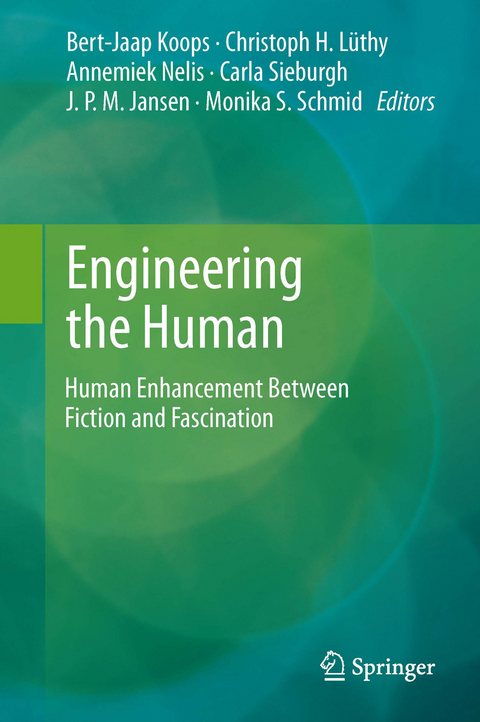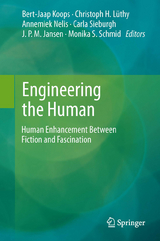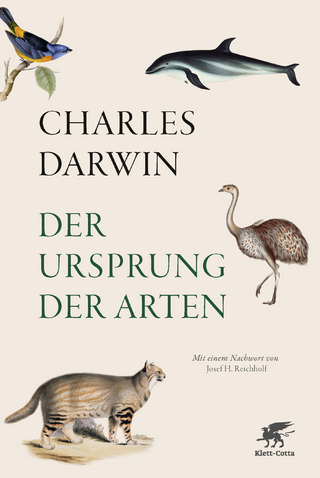Engineering the Human
Springer Berlin (Verlag)
978-3-642-35095-5 (ISBN)
Bert-Jaap Koops (1967) is professor of Regulation and Technology at Tilburg University and a member of The Young Academy. He studied Mathematics as well as General Literature at the University of Groningen, and obtained a PhD in Law at Tilburg University. He researches the relation between technology (ICT, bio-, nano-, and neurotechnology) and regulation issues, focusing on digital rights, digital crime, privacy, DNA forensics, and human enhancement. Christoph Lüthy (1964) teaches History of Science at Radboud University Nijmegen and is a member of The Young Academy. He studied Philosophy and Modern Linguistics at Oxford and Physics at Basel, and obtained his PhD in the History of Science at Harvard. His research focuses on the historical interaction between the natural sciences and philosophy. Annemiek Nelis (1970) is general director of the Centre for Society and Genomics at Radboud University Nijmegen. She studied Health Sciences in Maastricht and Bath and obtained her PhD in the Sociology of Science and Technology at the University of Twente. She researches the social aspects of genetics and genomics. In her research she mainly focuses on questions concerning citizenship, democracy, and expertise. Carla Sieburgh (1969) is professor of Civil Law at Radboud University Nijmegen and a member of The Young Academy. She studied Medicine and Law at the University of Groningen, served her medical internship in Amsterdam and Curaçao, and obtained her PhD in Law at the University of Groningen. She researches the principles of civil law and its relation to European law, fundamental rights, criminal law, administrative law, judicial construction, and conflicts between legal approaches and other fields, such as mathematical principles.
Towards Homo Manufactus? An Introduction to this Volume.- Historical and Philosophical Reflections on Natural, Enhanced and Artificial Men and Women.- Changing the Body Through the Centuries.- Human Enhancement in Future Explorations.- Genetic Enhancement of Human Beings: Reality or Fiction? Gulliver's Next Travels: A Journey into the Land of Biomaterials and Synthetic Life.- Human Robots and Robotic Humans.- Human Enhancement, Evolution and Lifespan: Evolving Towards Immortality? Opting for Prevention: Human Enhancement and Genetic Testing.- A Unique Copy: The Life and Identity of Clones in Literary Fiction.- Parents' Responsibility for Their Choices Regarding the Enhancement of Their Child.- Concerning 'Humans' and 'Human' Rights. Human Enhancement from the Perspective of Fundamental Rights.- Conclusion: The Debate About Human Enhancement.
From the reviews:
"Expert scientists review the gains in scientific capabilities to correct and enhance the human condition, beginning with historical reflections on past attempts to improve humankind through various eugenic programs that have since been labeled unethical. ... Many of the scenarios presented are compelling, and the potential outcomes will excite the imagination of a wide audience. Summing Up: Highly recommended. All academic, general, and professional library collections." (R. A. Hoots, Choice, Vol. 51 (7), March, 2014)
"One of the greatest strengths of Engineering the Human: Human Enhancement Between Fiction and Fascination is to provide information regarding the progress of some very creative applications of science such as the creation of intelligent robots, genetic alteration, and the creation of biomaterials. ... The book is appropriate for a wide range of scientists who are interested in science fiction, ethics, and the creative application of science to the human condition." (Robert D. Mather, PsycCRITIQUES, Vol. 59 (5), February, 2014)| Erscheint lt. Verlag | 26.2.2013 |
|---|---|
| Zusatzinfo | VI, 199 p. 9 illus., 4 illus. in color. |
| Verlagsort | Berlin |
| Sprache | englisch |
| Maße | 155 x 235 mm |
| Gewicht | 449 g |
| Themenwelt | Naturwissenschaften ► Biologie ► Evolution |
| Schlagworte | Evolution • Genetic Engineering • human enhancement • Human machines • Mensch |
| ISBN-10 | 3-642-35095-X / 364235095X |
| ISBN-13 | 978-3-642-35095-5 / 9783642350955 |
| Zustand | Neuware |
| Haben Sie eine Frage zum Produkt? |
aus dem Bereich




